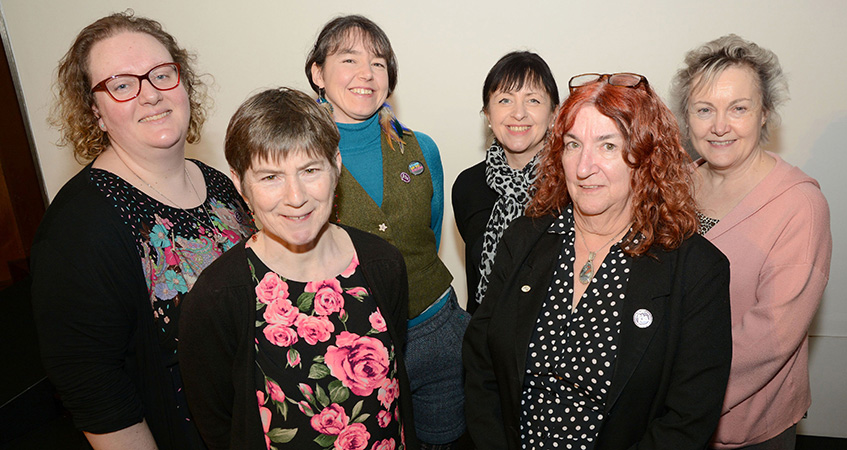Sisters standing strong: Reflections on TUC Women’s Conference 2020
As we mark the end of Women’s History Month, FDA Executive Committee member Margaret Haig reflects on this year’s TUC Women’s Conference, and shares her speech on the FDA’s motion on bullying and harassment in the House of Commons.

The TUC Women’s Conference is an amazing opportunity to hear about the range of issues faced by working women, whatever the sector. This year’s theme was #SistersStandingStrong and there was no end of strength and courage on display from speakers.
Whether it was motions to remind us of the fifty years since the Equal Pay Act, and of where equal pay is still not achieved, or challenging the poor record of maternity services for those in the criminal justice system, or the lack of appropriate footwear for women in many industries, these are issues that matter. They may not all affect us personally, but they matter to us because they affect our colleagues, our friends, our family, or just those we hear about on the grapevine. One brave delegate spoke movingly about the reasons she was made homeless and the fact this was hidden from many people; you could hear a pin drop when she was speaking.
We also had the chance to highlight an issue facing some of our members. I was very proud to move our motion on the issue of bullying and harassment in the House of Commons, where I was able to champion our recent success with the independent complaints process for complaints involving MPs and highlight the need for similar policies in the civil service and devolved administrations. The motion passed with a series of other motions on harassment, declaring from us all that #ThisIsNotWorking and harassment of all types needs to be eliminated from workplaces.
It was great to be back at the conference after a couple of years. I would recommend to anyone to go to any of the TUC conferences, to hear about important issues, meet other members from the FDA and MiP, and champion our own issues.
TUC Women’s Conference Speech – Sexual Harassment in the House of Commons
Chair, Conference, Margaret Haig for FDA, moving motion 41 on Sexual Harassment in the House of Commons.
Since submitting our motion to Women’s Conference, we have had a seismic win in Parliament. The House Commission has launched a consultation to finally implement a new, fully-independent Parliamentary Tribunal, and to determine sanctions on bullying, harassment and sexual harassment complaints in the House of Commons.
Consider this: until now, there has never been an MP appropriately sanctioned for a bullying or harassment complaint against a member of staff in the House of Commons.
This is not because MPs are the last bastions of proper workplace conduct, but because the system of self-regulation, where sanctions were determined by MPs utterly failed to deal with complaints. MPs would always close ranks, even across party lines, to protect each other.
The initial idea for the new Parliamentary Tribunal was designed by the FDA’s branch in the House of Commons and we submitted it to the House as the way forward, confident that it deals with the critical reasons why the complaints policy failed so badly in the past.
The House of Commons is currently consulting on the proposals and the consultation closes this Sunday, International Women’s Day. We have submitted our response to the consultation welcoming the Parliamentary Tribunal but the fight does not end there, so we still ask you to support this motion.
The House Commission asks whether the House should debate the report of an upheld bullying complaint in the circumstances that an MP may be expelled or suspended. A debate allows a vote and risks the repetition of the Lord Lester case in the House of Lords, when Lords overturned the sanction of an upheld complaint.
The threat of a debate on the floor of the House – where parliamentarians could reveal personal information about the complainant, cast doubt on the evidence, with them protected by parliamentary privilege but staff having no right of reply – may intimidate some from putting in their complaints at all.
Could you imagine this in any other workplace? MPs must put their faith in the new system, just as they are asking staff to, and vote not to give themselves a second, and ultimate, right of appeal.
Despite this, the introduction of the Parliamentary Tribunal is a massive victory for staff, a victory for the FDA members in the House of Commons who didn’t accept anything less than a fully independent policy or give up on what is right.
Now we are pressing for change for the civil service and ensuring there is independent procedure to deal with bullying, harassment and sexual harassment complaints against Ministers. You don’t need me to remind you of how important this is: events of the last few weeks and days have shown just how necessary this is. It is absurd to have a situation where a member of staff in Parliament could make a complaint against an MP but if that person is also a Minister a civil servant could not make a complaint about the same behaviours. We also have to turn our attention to the devolved administrations and parliaments: the battle may be won but the war is far from over.
I pay tribute to all the brave women and men who have spoken out – some after losing their careers – and fought to make Parliament a better place to work. Support this motion to support those workers in a fully independent complaints process.
Related News
-

FDA reiterates calls for a full independent bullying and harassment policy in the Senedd
Appearing before the Senedd Standards of Conduct Committee, FDA National Officer Jane Runeckles made clear that the process for dealing with bullying, harassment and sexual misconduct must be independent from MSs.
-

“Significant victory” for FDA members: MPs vote to introduce risk-based exclusion at the point of arrest
FDA welcomes MPs vote to introduce a formal mechanism to risk assess any MP at the point of arrest.
-

FDA calls on Senedd to implement “fully independent process for dealing with complaints of bullying, harassment and sexual harassment”
FDA Cymru|Wales has called on the Senedd to “implement a fully independent process for dealing with complaints of bullying, harassment and sexual harassment” made against MSs.